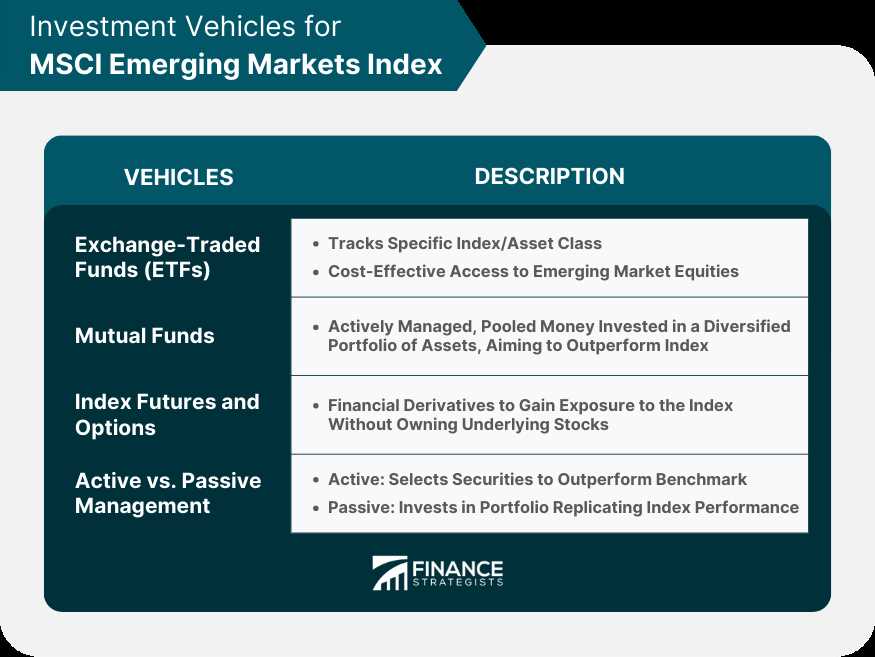What is MSCI Emerging Markets Index?
Overview

The MSCI Emerging Markets Index includes stocks from 27 emerging market countries, representing approximately 13% of the global equity market. These countries include China, India, Brazil, Russia, South Korea, and many others. The index is weighted by market capitalization, meaning that larger companies have a greater impact on the index’s performance.
The index is reviewed on a quarterly basis to ensure that it accurately reflects the current state of the emerging markets. This review includes a reevaluation of the constituent countries and any changes in their market capitalization. The index is also rebalanced annually to maintain its representativeness.
Investing in MSCI Emerging Markets Index
Investors can gain exposure to the MSCI Emerging Markets Index through various financial products, such as exchange-traded funds (ETFs) and mutual funds. These products aim to replicate the performance of the index by investing in a diversified portfolio of stocks from the constituent countries.
Overview of MSCI Emerging Markets Index
The MSCI Emerging Markets Index is a widely recognized benchmark that tracks the performance of emerging market equities. It is used by investors and fund managers to assess the overall performance of emerging markets and make investment decisions.
Emerging markets are countries that are in the process of rapid industrialization and economic growth. These markets offer significant investment opportunities, but they also come with higher risks compared to developed markets. The MSCI Emerging Markets Index provides investors with a comprehensive view of the performance of these markets.
Companies included in the MSCI Emerging Markets Index cover a wide range of sectors, including financials, technology, consumer goods, energy, and more. This diversification helps spread the risk and provides investors with exposure to various industries and sectors within emerging markets.
The MSCI Emerging Markets Index is market-capitalization weighted, which means that larger companies have a greater impact on the index’s performance. This approach reflects the relative size and importance of companies within the emerging markets.
Investors can gain exposure to the MSCI Emerging Markets Index through various investment vehicles, such as exchange-traded funds (ETFs) and mutual funds. These funds aim to replicate the performance of the index by investing in a portfolio of securities that closely mirrors the index’s composition.
Investing in the MSCI Emerging Markets Index can be a way for investors to diversify their portfolios and potentially benefit from the growth potential of emerging markets. However, it is important to note that investing in emerging markets comes with higher risks, including political instability, currency fluctuations, and regulatory challenges.
How to Invest in MSCI Emerging Markets Index
Educate Yourself
Before investing in the MSCI Emerging Markets Index, it is important to educate yourself about the index and the countries it represents. Familiarize yourself with the economic, political, and social factors that can impact the performance of these emerging markets.
Choose an Investment Vehicle
There are several ways to invest in the MSCI Emerging Markets Index. One option is to invest in an exchange-traded fund (ETF) that tracks the index. ETFs offer the advantage of being easily tradable on the stock exchange and providing diversification across multiple companies and countries.
Another option is to invest in mutual funds that focus on emerging markets. These funds are managed by professional fund managers who select a portfolio of stocks from the index. Mutual funds can be a good choice for investors who prefer a hands-off approach.
Consider Risk and Return
Investing in emerging markets can offer the potential for high returns, but it also comes with higher risks. It is important to carefully consider your risk tolerance and investment goals before investing in the MSCI Emerging Markets Index.
Emerging markets can be volatile and subject to political instability, currency fluctuations, and regulatory changes. Diversification and a long-term investment horizon can help mitigate these risks.
Monitor and Rebalance
Once you have invested in the MSCI Emerging Markets Index, it is important to regularly monitor your investment and rebalance your portfolio as needed. Keep track of the performance of the index and the individual companies within it.
Rebalancing involves adjusting your portfolio to maintain your desired asset allocation. This can involve buying or selling investments to bring your portfolio back in line with your investment strategy.
Consult a Financial Advisor
If you are unsure about how to invest in the MSCI Emerging Markets Index or need personalized advice, consider consulting a financial advisor. They can help you assess your investment goals, risk tolerance, and recommend suitable investment options.
| Advantages | Disadvantages |
|---|---|
| Exposure to high-growth emerging markets | Higher volatility and risk |
| Diversification across multiple countries and companies | Political and regulatory risks |
| Potential for high returns | Currency fluctuations |
| Liquidity and tradability of ETFs | Emerging market-specific risks |
Investing in the MSCI Emerging Markets Index can be a strategic way to gain exposure to the growth potential of emerging markets. By following these steps and conducting thorough research, investors can make informed decisions and potentially benefit from the opportunities offered by these markets.

Emily Bibb simplifies finance through bestselling books and articles, bridging complex concepts for everyday understanding. Engaging audiences via social media, she shares insights for financial success. Active in seminars and philanthropy, Bibb aims to create a more financially informed society, driven by her passion for empowering others.
